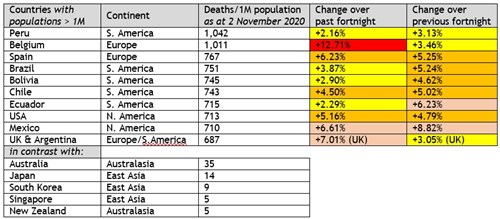“There is a balance to be struck between events which distract and events which fire the imagination. For me, the 0 - 5 model of home working strikes this balance in the wrong place, as with hindsight did my pre-pandemic 5 - 0 model."
Andy Haldane
As we plunge back into lockdown in order to avoid an NHS meltdown over Christmas, it’s understandable that many people and businesses will be thinking primarily about the short-term. I am probably more optimistic than most in that respect, in anticipating a range of vaccines being with us shortly; if this is the case, the situation could look very different in the New Year.
 In Europe and the Americas, we have undoubtedly made mistakes over the past months: allowing the virus to spread, while in eastern Asia a much tighter clamp has been kept on infections (see table opposite).
In Europe and the Americas, we have undoubtedly made mistakes over the past months: allowing the virus to spread, while in eastern Asia a much tighter clamp has been kept on infections (see table opposite).
We have also learnt more about the long-term impact of the virus - which clearly merits more attention than it has received - across all age groups. Human enterprise depends on creativity, energy and a persistent attitude; all of which appear to be challenged by the long-term Covid-19 impacts. In this commentary, we ask whether the Bank of England’s chief economist was right to overlook these in his recent autumn lecture on the disadvantages of home-working.
Andy Haldane, who is also a member of the Monetary Policy Committee, presented his autumn lecture to the Engaging Business Summit, entitled ‘Is Home Working Good For You?’ One of his key observations was on creativity, and how lack of social interaction can restrict it. While he acknowledges a number of plus factors, his overall conclusion is that creativity benefits more from the distraction and noise of the workplace, and that these outweigh ‘cognitive tunnelling’ in maintaining workflow.
He may be right, and he certainly accepts that a degree of balance is called for – see our opening quote from his speech.
However, it is social interaction which has taken us back to lockdown again. It is social interaction which has brought about over one million acknowledged infections to date (although I suspect that the true number is closer to ten million), together with nearly fifty thousand deaths. These infections are not just nurtured in pubs and street gatherings.
Covid-19 may also challenge creativity in a much more insidious and long-lasting way, if our developing understanding of ‘Long Covid’ is correct. It may permanently handicap the mental capacity of those who develop symptoms and, possibly, those who do not. The long-term effects may not be so selective in their targeting of old people: the young may also experience reduced mental agility as they grow older. If this is the case, Andy Haldane’s comments about creativity could be eclipsed by much more serious long-term damage resulting from the virus itself.
However, cavalier attitudes appear to be prevalent in the student community, as this comment from Nottingham Chief Constable Craig Guildford makes clear: "Sadly many of the incidents we attended overnight again were student parties. We know that both universities have been trying to help get the message across to students, but for some it doesn't seem to be getting through."
The truth is, that we don’t yet know what the long-term impact will be. But is it worth the risk? Is it not better to maintain a tight discipline over these last 3-4 months before the vaccine becomes available, and it becomes possible to stamp out this virus in the same way as we have with so many others, including polio, smallpox and measles?
That appears to be the conclusion reached in East Asia, Australia and New Zealand and, if there is a long-term impact on ‘cognitive tunnelling’ and mental capacity, these regions could be left with an inbuilt competitive advantage over the west.
Over the past five decades we have moved a long way forward in developing creative opportunity and encouragement for people at work: in fact, our challenge is now to keep pace with technology so that it doesn’t start overtaking human enterprise.
But we remain heavily conscious of - and dependent on - short-term thinking, and we continue to discount the future heavily. That’s why addressing climate change is such a battle: we cannot imagine the future to anywhere near the same degree as we experience the present day.
We have now learnt that pursuing herd immunity with Covid-19 is not a good idea. It is unlikely to build long-term immunity and it gives rise to Long Covid health problems.
The way to control this disease will be by vaccination, and it may require annual doses in the same way as flu is controlled. Let’s get to that point as soon as possible and, in the interim – including Christmas – let’s not allow the virus to take hold as it has done in so many places and situations over the past few months.
Maintaining the capacity for human enterprise is too important to put at risk.
Gavin Oldham OBE
Share Radio

